September 19, 2023
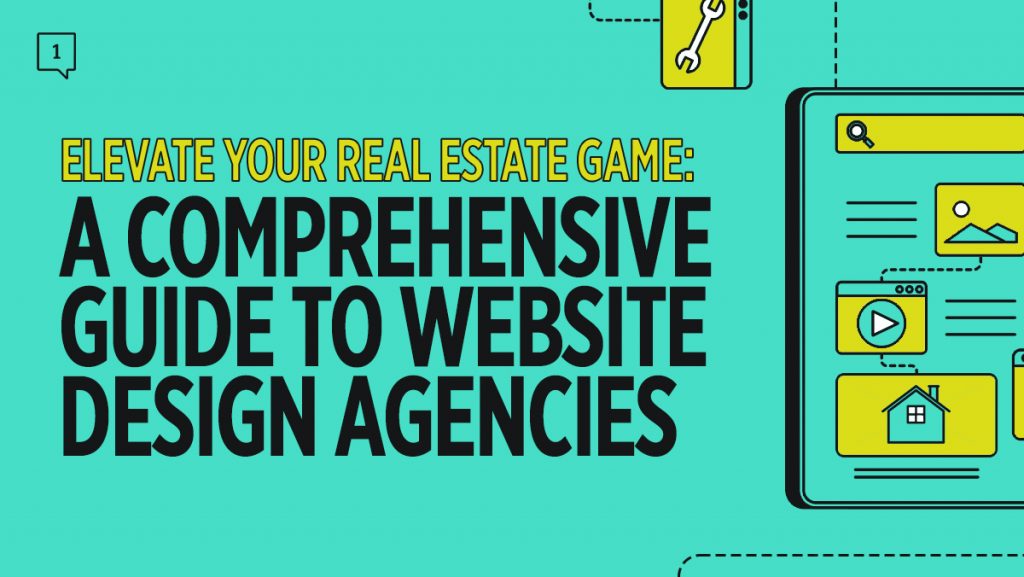

In today’s digital age, a robust online presence is vital for real estate agents. Real estate website design companies play a pivotal role in achieving this. In this comprehensive guide, I’ll discuss their importance and how they could help you succeed in the competitive real estate market.
This article will provide essential insights to boost your online adventure, whether you are an experienced agent or fresh to the profession. Let’s look at how these companies can help you navigate the digital real estate world.
Real estate website design agencies are specialized firms that focus on creating and optimizing websites tailored specifically for the real estate industry. These agencies bring together a team of skilled professionals, including web designers, developers, content creators, and digital marketers, who collaborate to design and develop websites that cater to the unique needs and objectives of real estate agents and brokerages.
Here are some key aspects to understand about real estate website design agencies:
Expertise in Real Estate: These agencies have a deep understanding of the real estate market, including its dynamics, trends, and target audiences. This industry knowledge allows them to create websites that resonate with potential clients and showcase property listings effectively.
Customization: Real estate website design agencies don’t offer one-size-fits-all solutions. Instead, they tailor each website to the specific goals and branding of the agent or brokerage. This customization ensures that the website reflects the unique identity of the business.
Responsive Design: In today’s mobile-centric setting, having a flexible website that adapts to different devices effortlessly is critical. Responsive design is prioritized by real estate website design businesses to ensure that your site appears and performs seamlessly on smartphones, tablets, and desktop computers.
Search Engine Optimization (SEO): To attract organic traffic and rank higher on search engine results pages, these agencies incorporate SEO best practices into the website design. This helps potential clients find your website more easily.
Integration of MLS/IDX: Many real estate websites rely on Multiple Listing Service (MLS) and Internet Data Exchange (IDX) integrations to display property listings accurately and efficiently. Real estate website design agencies are well-versed in implementing and optimizing these integrations.
User-Friendly Features: They prioritize user experience, making it easy for visitors to navigate the site, search for properties, and get in touch with real estate agents. Intuitive features like property search filters and interactive maps are common elements in their designs.
While real estate website design agencies are experts in creating and optimizing websites, the active involvement of real estate agents in the process is 100% required. Here’s a closer look at the essential roles agents play in website design:
Defining Goals and Objectives: Real estate agents have a unique perspective on their business goals and target audience. They provide crucial input in setting clear objectives for the website, such as lead generation, branding, or showcasing property listings.
Content Creation: Real estate agents are the primary source of content for their websites. They contribute property descriptions, high-quality images, videos, and blog posts that showcase their listings and market expertise. This content helps create a compelling online presence.
Branding and Personalization: Real estate agents bring their personal brand and style to the design process. They collaborate with designers to ensure that the website’s visual elements, color schemes, and overall aesthetics align with their branding and personality.
Client-Centric Approach: Agents understand their clients’ needs and preferences. They can offer vital insights towards building a user-friendly experience for potential buyers and sellers.
Property Listings Management: Real estate agents are responsible for keeping property listings up to date on their websites. They work closely with website designers to ensure that property details, pricing, and availability are accurate.
Client Testimonials and Reviews: Agents often gather client testimonials and reviews. These can be featured on the website to build trust and credibility among potential clients.
Local Market Insights: Real estate agents possess valuable knowledge about their local real estate market. They contribute insights and information that can be shared through blog posts, market reports, and neighborhood guides.
Lead Generation Strategies: Agents work with designers to implement lead capture forms and call-to-action elements strategically throughout the website. They provide input on the most effective ways to convert visitors into leads.
Compliance: Real estate agents must strictly follow compliance guidelines set by their brokerage, the Department of Real Estate, or the Realtor Association. These rules are essential to ensure legal adherence and minimize the risk of lawsuits. Compliance includes adhering to real estate laws, data protection regulations, accessibility standards, transparent advertising practices, and copyright laws. It is vital for agents to continually update their websites to align with evolving regulations and maintain trust with clients.

The answer is a big YES! Real estate agents not only profit from having websites, but it has become a requirement in many respects to flourish in the market. Here are a few compelling reasons:
24/7 Accessibility: A website serves as your virtual storefront, available round the clock. Prospective clients can browse listings, learn about your services, and get in touch with you at their convenience, even outside of traditional office hours.
Credibility and Professionalism: A well-designed website conveys professionalism and trustworthiness. It showcases your commitment to your real estate business, which can make a positive impression on potential clients.
Showcasing Listings: Your website is an ideal platform to display property listings in an organized and visually appealing manner. Detailed property information, high-quality images, and virtual tours can be easily presented to potential buyers.
Local Market Presence: With localized SEO strategies, your website can appear in local search results, making it easier for clients to find you when they search for real estate services in your area.
Effective Marketing: Your website acts as a central hub for all your marketing efforts. You can share blog posts, market reports, and neighborhood insights, positioning yourself as an expert in your field.
Lead Generation: Through contact forms and lead capture tools, your website can help generate leads even when you’re not actively marketing. These leads can be nurtured and converted into clients over time.
Competitive Advantage: Many of your competitors likely already have websites. To stay competitive, having an online presence is crucial. It allows you to keep up with or surpass industry standards.
Flexibility and Control: With your website, you have full control over your content, branding, and messaging. You can adapt and update your site as needed to reflect your changing business priorities.
Client Convenience: Clients appreciate the convenience of browsing properties and gathering information online. It saves them time and helps them make informed decisions.
Networking and Referrals: A website can serve as a hub for networking and referrals within the real estate industry. You can showcase your partnerships and affiliations, further establishing your credibility.
Showcasing Trust and Credibility: In real estate, trust is paramount. Testimonials and case reviews on your website provide tangible proof of your expertise and reliability. Testimonials offer firsthand accounts of satisfied clients, while case reviews delve deeper into your successful transactions, highlighting your problem-solving skills and dedication. Together, these elements build trust and set you apart as a credible and capable real estate agent.
Real estate website design agencies go above and beyond to ensure that your online presence stands out in the competitive real estate industry. Here’s a deeper dive into the strategies and services they offer to elevate your digital footprint:
Custom Website Design: Real estate website designers create visually appealing and unique websites tailored specifically to your brand and goals. They craft a design that aligns with your style, making your website distinctive and memorable.
Innovative Features: Agencies are adept at implementing innovative features like 3D virtual tours, augmented reality (AR) property viewing, and interactive floor plans. These cutting-edge technologies provide an immersive experience that sets you apart from competitors.
Localized Content: They create localized content that resonates with your target audience. Whether it’s highlighting unique neighborhood amenities, school districts, or local events, agencies ensure your website speaks directly to your community.
Social Proof: Agencies help you leverage social proof by prominently displaying awards, industry affiliations, and certifications on your website. This enhances your credibility and establishes you as a trusted real estate professional.
Multi-Language Support: For agents serving diverse communities, agencies can implement multi-language support on your website to cater to a broader audience.
Email Automation: They set up email automation workflows that nurture leads at every stage of the buying or selling process. This keeps potential clients engaged and informed, ultimately increasing the likelihood of conversion.
Personalized User Experiences: Through data-driven insights and user segmentation, agencies can personalize user experiences. Tailored content and recommendations make visitors feel valued and more likely to return.
Mobile Apps: Some agencies offer mobile app development services, allowing you to provide a dedicated mobile experience for your clients. This can include property search functionality and direct communication channels.
Accessibility Compliance: Agencies ensure your website complies with accessibility standards, making it usable for individuals with disabilities. This inclusive design not only broadens your audience but also reflects your commitment to diversity and inclusion.
Data Security: With increasing concerns about data privacy, agencies prioritize data security measures to protect client information and ensure compliance with regulations.
The cost of hiring a real estate website design company can vary significantly based on various factors. While it’s essential to understand that each project’s price tag is unique, here are some key factors that influence the cost of their services:
Scope of the Project: The size and complexity of your website project play a significant role in determining the cost. A basic website with essential features will be more affordable than a complex, multi-page site with advanced functionalities.
Customization: If you require extensive customization, such as unique design elements, interactive features, or specialized integrations, expect to pay more. Customization adds complexity to the project and often involves more hours of work.
Content Creation: The cost may also depend on whether the agency is responsible for creating content, including property descriptions, blog posts, and images. Professional content creation can add to the overall cost.
IDX/MLS Integration: If your website requires integration with IDX or MLS services to display property listings, this can affect the cost. Agencies may charge extra for setting up and maintaining these integrations.
Responsive Design: Ensuring that your website is responsive and functions well on all devices is essential. The complexity of achieving responsive design can impact pricing.
SEO Services: If you want the agency to provide ongoing search engine optimization services, this could be an additional cost. SEO services are crucial for ensuring your website ranks well in search results.
Maintenance and Updates: Consider whether the agency includes ongoing maintenance and updates in their pricing. This can be beneficial for keeping your website secure and up-to-date.
Contract Type: Some agencies offer one-time project-based pricing, while others provide ongoing support through monthly retainers. The chosen contract type can affect the overall cost structure.
Estimates for real estate website design services can vary widely based on the factors mentioned earlier. To provide a rough range of potential costs, here are some general estimates:
Basic Website: A simple real estate website with a few pages, basic property listings, and standard design elements could range from $1,000 to $5,000.
Mid-Range Website: A more comprehensive website with additional features like responsive design, lead capture forms, blog integration, and SEO optimization may cost between $5,000 and $10,000.
Custom Website: If you require a highly customized website with unique design, advanced functionality, IDX/MLS integration, and content creation, the cost could range from $10,000 to $20,000 or more.
Ongoing Services: If you opt for ongoing services like SEO, content updates, and maintenance, monthly retainers can vary widely but may start at $500 to $2,000 per month.
E-commerce Functionality: If you plan to sell products or services through your website, the cost for e-commerce integration and setup can add an additional $1,000 to $5,000 or more.
The cost of hiring a real estate website design company can vary significantly based on various factors. While it’s essential to understand that each project’s price tag is unique, here are some key factors that influence the cost of their services:
Scope of the Project: The size and complexity of your website project play a significant role in determining the cost. A basic website with essential features will be more affordable than a complex, multi-page site with advanced functionalities.
Customization: If you require extensive customization, such as unique design elements, interactive features, or specialized integrations, expect to pay more. Customization adds complexity to the project and often involves more hours of work.
Content Creation: The cost may also depend on whether the agency is responsible for creating content, including property descriptions, blog posts, and images. Professional content creation can add to the overall cost.
IDX/MLS Integration: If your website requires integration with IDX or MLS services to display property listings, this can affect the cost. Agencies may charge extra for setting up and maintaining these integrations.
Responsive Design: Ensuring that your website is responsive and functions well on all devices is essential. The complexity of achieving responsive design can impact pricing.
SEO Services: If you want the agency to provide ongoing search engine optimization services, this could be an additional cost. SEO services are crucial for ensuring your website ranks well in search results.
Maintenance and Updates: Consider whether the agency includes ongoing maintenance and updates in their pricing. This can be beneficial for keeping your website secure and up-to-date.
Contract Type: Some agencies offer one-time project-based pricing, while others provide ongoing support through monthly retainers. The chosen contract type can affect the overall cost structure.
Estimates for real estate website design services can vary widely based on the factors mentioned earlier. To provide a rough range of potential costs, here are some general estimates:
Basic Website: A simple real estate website with a few pages, basic property listings, and standard design elements could range from $1,000 to $5,000.
Mid-Range Website: A more comprehensive website with additional features like responsive design, lead capture forms, blog integration, and SEO optimization may cost between $5,000 and $10,000.
Custom Website: If you require a highly customized website with unique design, advanced functionality, IDX/MLS integration, and content creation, the cost could range from $10,000 to $20,000 or more.
Ongoing Services: If you opt for ongoing services like SEO, content updates, and maintenance, monthly retainers can vary widely but may start at $500 to $2,000 per month.
E-commerce Functionality: If you plan to sell products or services through your website, the cost for e-commerce integration and setup can add an additional $1,000 to $5,000 or more.
A captivating online presence is vital in the real estate industry’s ever-changing digital landscape. This visibility begins with a well-designed website, and the skills of a real estate website design firm may make all the difference. Here, we continue to explore the reasons why enlisting the services of such an agency is a smart investment:
Cost-Effective Solutions: Contrary to the perception that professional website design might be expensive, hiring a real estate website design agency often proves cost-effective in the long run. Their expertise allows them to create efficient, conversion-focused websites that can yield a high return on investment.
Tailored Marketing Strategies: Beyond website design, agencies often offer marketing services tailored to the real estate industry. This includes strategies for content marketing, social media engagement, and pay-per-click advertising, all aimed at increasing your online visibility.
Comprehensive Solutions: Real estate website design agencies provide a one-stop solution for all your digital needs. From initial design to ongoing maintenance, SEO, and marketing, you can streamline your online efforts under one roof.
Time Savings: Building and maintaining an effective website can be time-consuming. By outsourcing these tasks to professionals, you free up your schedule to focus on what you do best: serving your real estate clients.
Access to Technology: Agencies have access to advanced design and marketing tools that may be cost-prohibitive for individual agents. They may incorporate cutting-edge features and keep up with market trends thanks to this technology.
Legal Compliance: Because the real estate market is so heavily regulated, your website must abide by all applicable laws and rules. Design firms are knowledgeable about these legal standards and can make sure that your website complies.
Scalability: Whether you’re a solo agent or part of a larger brokerage, agencies can scale their services to meet your specific needs. They can adapt their strategies as your business grows and evolves.
Focus on User Experience: Real estate website design agencies prioritize user experience, making your website not only visually appealing but also intuitive and user-friendly. This enhances engagement and encourages visitors to explore further.
Lead Generation Expertise: Real estate website design agencies understand the nuances of lead generation in the real estate market. They implement strategies such as lead capture forms, effective calls-to-action, and user engagement tactics to ensure that your website becomes a powerful lead generation tool, helping you grow your client base.

In this free 20 minute video training you’ll discover:
Whenever you are ready, click the ORANGE button below that says “Grab my training now”
Choosing the best design firm for your real estate website is a key decision that may have a significant impact on your digital presence and business performance. Consider the following aspects when selecting the best agency for your real estate website to guarantee you make an informed and useful decision:
Industry Expertise: Look for an agency that has a demonstrated track record of dealing with real estate professionals. Because of their industry knowledge, they are more likely to grasp your specific demands and provide customized solutions.
Portfolio and References: Review the agency’s portfolio to gauge the quality and diversity of their previous projects. Additionally, don’t hesitate to request references from their past clients to gain insights into their working relationships and outcomes.
Customization and Flexibility: Always make sure that the agency is willing and able to personalize your website to match your brand and goals. A one-size-fits-all strategy may not sufficiently portray your own personality.
Responsive Design: Inquire about their approach to mobile responsiveness. A website that functions seamlessly on smartphones and tablets is crucial in today’s mobile-driven world.
SEO Expertise: Ask about their SEO strategies and how they plan to optimize your website for search engines. High search engine rankings are vital for attracting organic traffic.
Lead Generation: Inquire about their strategies for lead generation. Effective lead capture forms, calls-to-action, and user engagement features are essential for converting visitors into clients.
Cost and Contract Structure: Clearly understand the agency’s pricing structure, including any ongoing costs. Ensure that the contract aligns with your budget and needs.
Support and Maintenance: Ask about their post-launch support and maintenance services. Regular updates, security measures, and technical support are vital for the long-term success of your website.
Legal Compliance: Ensure the agency is knowledgeable about the legal requirements of real estate websites, including data privacy regulations.
Choosing the right real estate website design agency is a critical step toward building a compelling online presence and thriving in the competitive real estate industry. To help you in your search, here are five top real estate website design agencies known for their expertise, creativity, and client satisfaction:
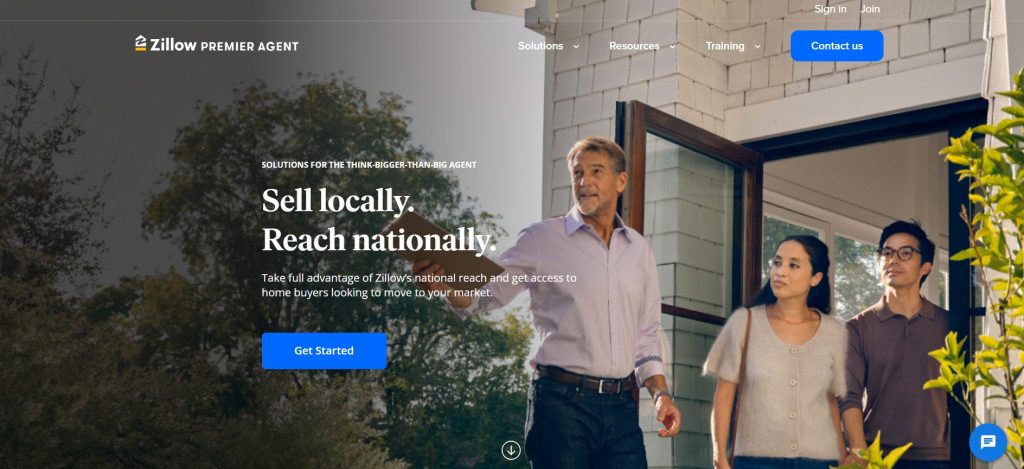
Zillow, a prominent name in real estate, offers Premier Agent Websites. These websites are designed specifically for real estate professionals, with features like IDX integration, lead capture forms, and a user-friendly interface. Zillow’s extensive experience in the industry and a vast network of users make it a go-to choice for agents looking for an effective online presence.
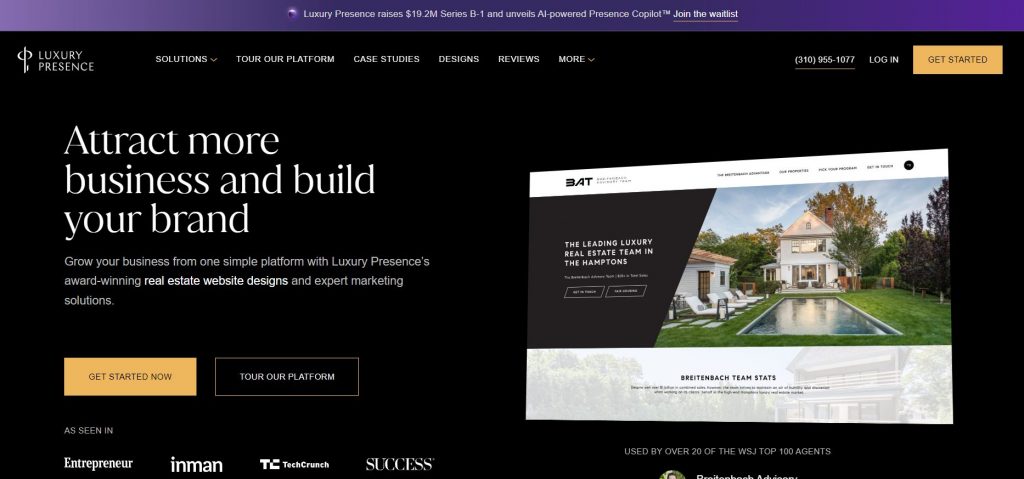
Luxury Presence is a renowned real estate website design agency specializing in creating visually stunning and highly functional websites for real estate professionals. Their websites are mobile-responsive, customizable, and include integrated IDX listings. Luxury Presence is committed to delivering beautiful, conversion-focused websites tailored to the real estate industry.
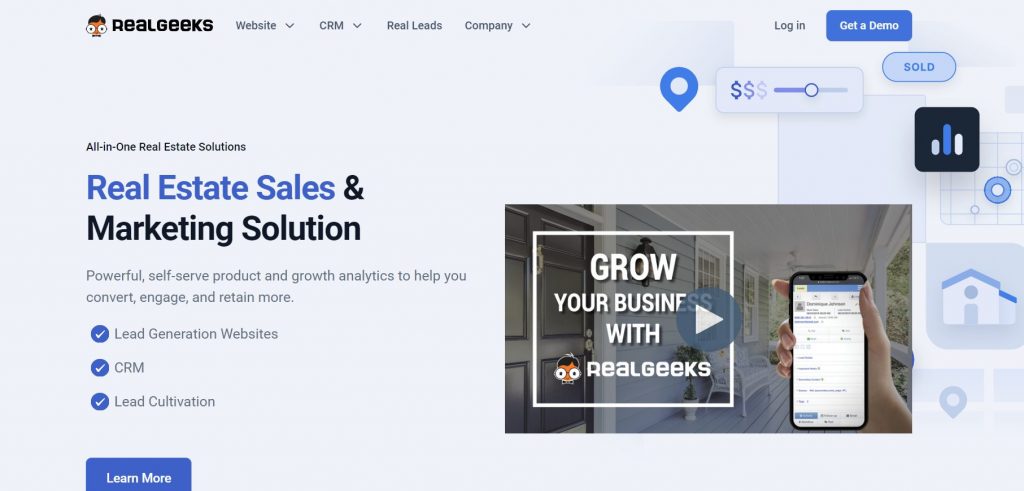
Real Geeks is a leading provider of real estate website design and marketing solutions. They offer comprehensive websites with IDX integration, CRM tools, and robust lead generation features. Real Geeks’ platforms are known for their user-friendly design and effective lead capture capabilities.
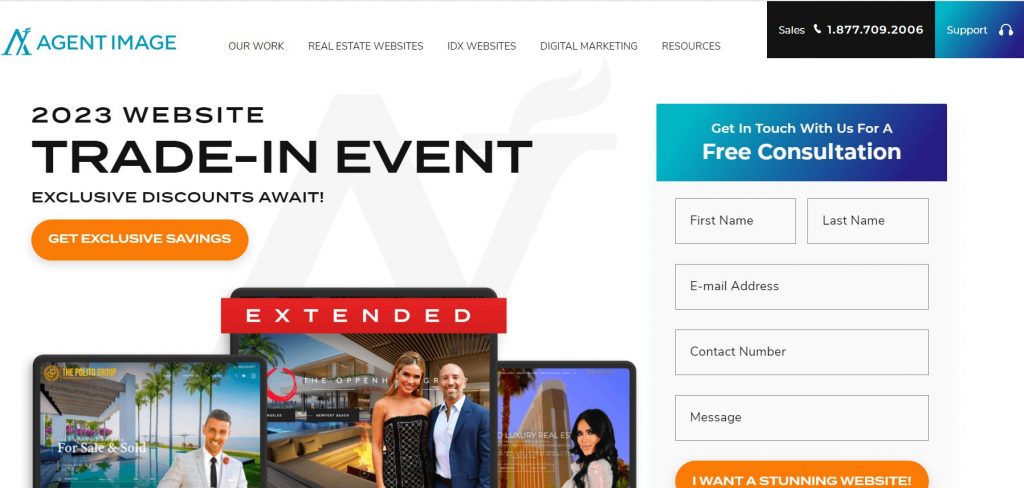
Agent Image is a versatile real estate website design agency serving individual agents and larger brokerages. They provide customizable websites, IDX integration, and marketing tools. Agent Image’s modern design options and user-friendly platform make it a popular choice among real estate professionals.
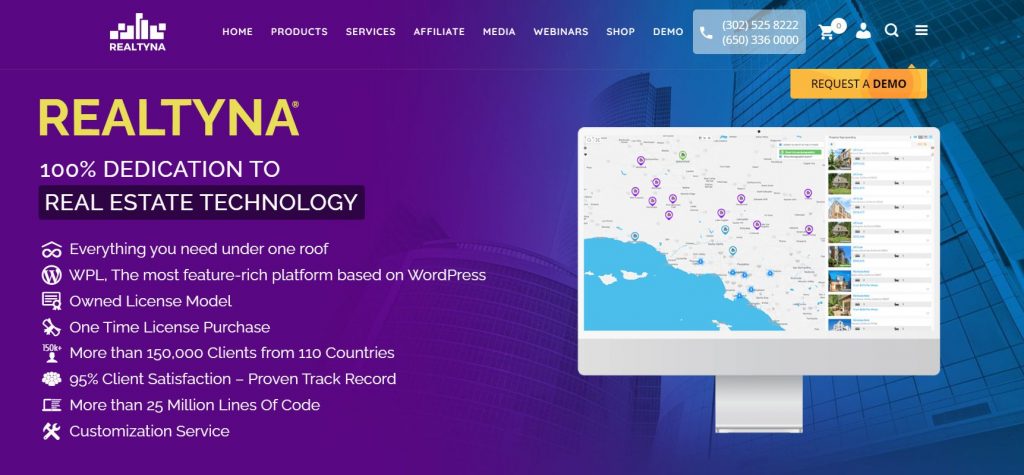
Realtyna specializes in advanced IDX solutions and website design for real estate agents and brokers. Their products, like the WPL (WordPress Property Listing) plugin, seamlessly integrate MLS data into WordPress websites, offering flexibility and customization. Realtyna is renowned for its technical proficiency and ability to design feature-rich real estate websites.
Before making a decision, carefully evaluate your specific needs, budget, and long-term goals. Consider reaching out to these agencies to discuss your requirements and request demos or consultations. Ultimately, the best real estate website design agency for you will align with your vision and help you create a powerful online presence in the competitive real estate market.
Emmanuel here and my goal is to empower 1 billion realtors with tools to generate business online. Think you can be one of them?